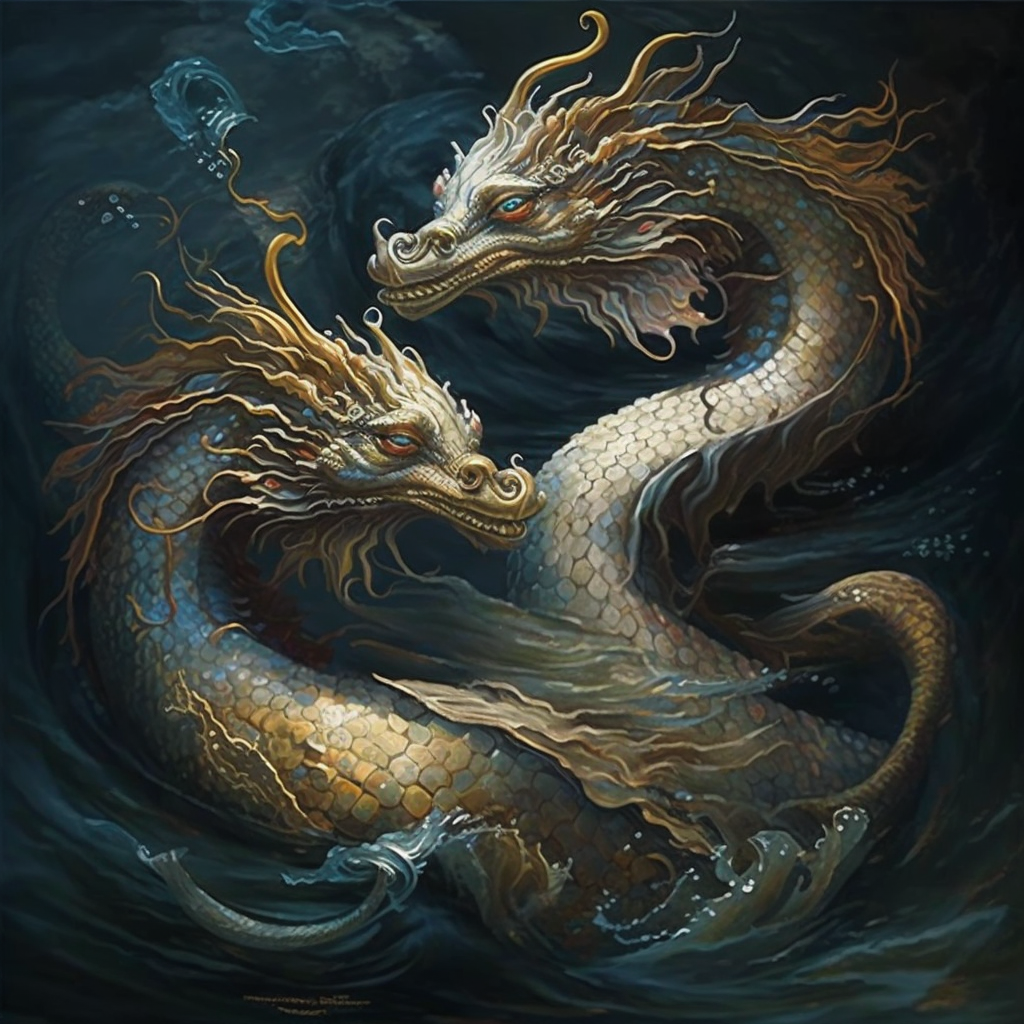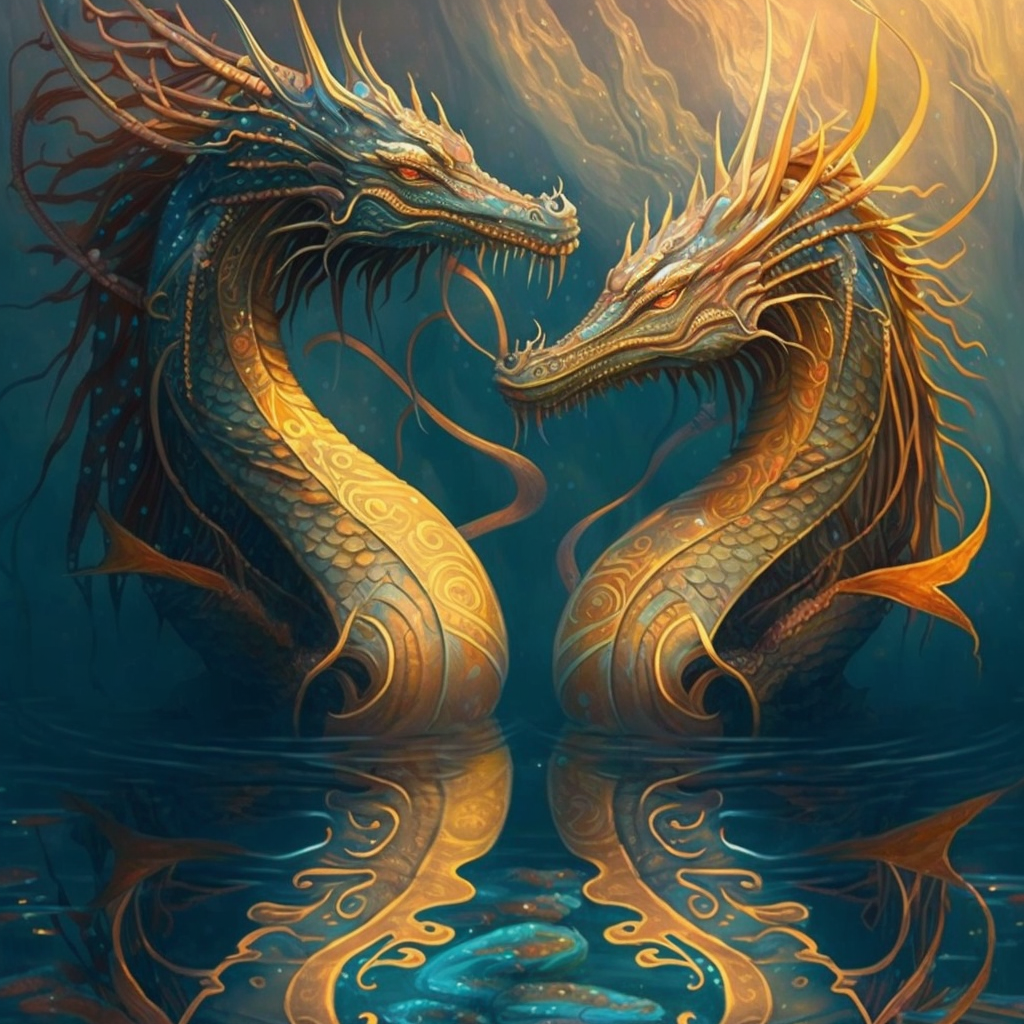Gods Lahmu and Lahamu
In ancient Mesopotamian mythology, Lahmu and Lahamu were the first pair of divine beings, often depicted as serpent-like dragons or protective deities associated with the primordial waters.

- Pantheon: Mesopotamian pantheon
- Deity Title: Lahmu and Lahamu, the first-born deities “Slaughterers of the Demons”
- Deity Symbol: Entwined Serpents
- Home Plane: None; they exist in the realm of the gods
- Deity Level: Greater deities
- Alignment: Neutral Good
- Aliases: None
- Superior: Anu (father of the gods)
- Traditional Allies: Anshar, Anu, Kishar, Marduk, Ea, Enki, Enlil, Marduk
- Traditional Foes: Kingu, Tiamat, Pazuzu, Ereshkigal
- Divine Artifact: None
- Servants: None
- Servitor Creatures: None
- Sacred Animal: The bull
- Manifestations: Taking physical form to appear before mortals and guide them
- Signs of Favor: Fertility, abundant harvests, protection in battle
- Worshipers: Farmers, warriors, those seeking protection and guidance
- Cleric Alignments: Neutral Good, Lawful Good
- Specialty Priests: None
- Holy Days: No specific holy days, but they are often honored during Mesopotamian festivals
- Portfolio: Creation of the universe, protection of mortals, guidance and wisdom
- Domains: Protection, Creation, Good, Knowledge
- Favored Weapon: None
- Favored Class: Cleric
- Favored Race: None
- Duties of the Priesthood: To offer guidance and protection to the worshipers of Lahmu and Lahamu, to tend to their temples and ensure their proper worship and offerings are made
- Major Cult/Temple Sites: The cities of Nineveh and Babylon in ancient Mesopotamia
- Benefits: Divine protection and guidance, fertility and abundant harvests, aid in battle
Lahmu and Lahamu are the first divine beings in ancient Mesopotamian mythology. They are often depicted as serpent-like dragons or protective deities associated with the primordial waters. As the progenitors of the cosmos, they are believed to have played a pivotal role in the creation of the universe.
Lahmu is a fierce dragon with a powerful build and shimmering scales that glint in the light. He is often depicted with sharp fangs and claws, ready to defend his realm against any threat. Despite his fearsome appearance, Lahmu is a just and fair deity who takes his responsibilities as a creator very seriously. He wants to ensure that his creations are protected and thrive, and is always looking for ways to improve the universe he has helped to bring into existence.
Lahamu, on the other hand, is a graceful and serene deity with a gentle disposition. She is often depicted as a winged serpent, floating effortlessly on the primordial waters. She represents the nurturing and life-giving aspect of creation, and is responsible for ensuring that the universe is sustained and nourished. Lahamu is deeply compassionate and cares deeply about all the beings she has helped to create.
Together, Lahmu and Lahamu form a formidable duo, complementing each other’s strengths and working in harmony to create a balanced and harmonious universe. Their ultimate goal is to ensure that their creations thrive and reach their full potential, and they will do whatever it takes to make this a reality. Whether battling against chaos and destruction or nurturing new life, Lahmu and Lahamu are always there, watching over their creation and guiding it towards a bright and prosperous future.
Currently

Lahmu and Lahamu are ancient Mesopotamian deities, responsible for the creation of the universe. Despite their divine origins, they have always taken an active interest in the affairs of mortals, guiding and protecting humanity whenever possible. In the year 1453, they are particularly concerned about the fate of the Byzantine Empire, which is under threat from the Ottoman Turks.
Lahmu and Lahamu have been watching events unfold for some time, monitoring the progress of the Ottoman armies as they encroach ever closer to Constantinople. They are deeply saddened by the suffering and devastation that war has brought to the region, and are determined to do what they can to help.
With this in mind, they decide to appear to the Emperor of Byzantium, offering him their guidance and protection. As they materialize before him, the Emperor is awestruck by their beauty and power, but also a little afraid. He has heard tales of these ancient deities and knows that they are not to be trifled with.
Lahamu speaks first, her voice like the rustle of leaves on a gentle breeze. She tells the Emperor that she and Lahmu have been watching events unfold, and that they are deeply concerned about the fate of his empire. She offers him her support, promising to do everything in her power to help him defend his people and his lands.
Lahmu adds his voice to hers, his deep rumbling tones echoing through the throne room. He tells the Emperor that he will send his armies of dragons to assist in the defense of the city, using their fire and strength to drive back the Ottoman forces.
The Emperor is overwhelmed by their offer, thanking them profusely for their aid. With Lahmu and Lahamu at their side, the Byzantine forces are infused with new hope and determination. They fight with renewed vigor, bolstered by the knowledge that they have divine protectors watching over them.
In the end, the battle for Constantinople is long and bloody, but ultimately successful. The Ottoman forces are pushed back, and the city is saved. Lahmu and Lahamu watch over the triumphant Byzantines as they celebrate their hard-fought victory, proud of the role they played in securing the safety of their people.
As they fade back into the ether, Lahmu and Lahamu know that they have done what they could to help humanity in their time of need. They will continue to watch over mortals, guiding and protecting them whenever possible, always striving to make the world a better and safer place. Their divine powers may be great, but it is their compassion and concern for the wellbeing of all beings that truly sets them apart. And so, they disappear into the realm of the gods, ready to continue their eternal mission of aiding those in need.

 Buy me a coffee
Buy me a coffee